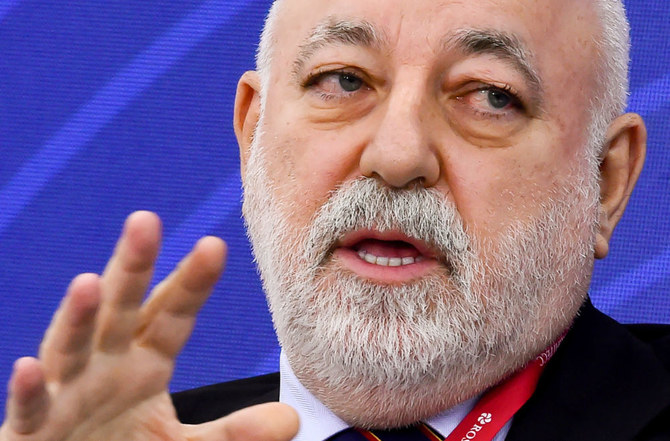WASHINGTON: The US has begun an aggressive new push to inflict pain on Russia’s economy and specifically its oligarchs with the intent of thwarting the Kremlin’s invasion of Ukraine.
From the Treasury Department to the Justice Department, US officials will focus on efforts to legally liquidate the property of Russian oligarchs, expand financial penalties on those who facilitate the evasion of sanctions, and close loopholes in the law that allow oligarchs to use shell companies to move through the US financial system.
Andrew Adams, who heads the US government’s KleptoCapture task force, designed to enforce the economic restrictions within the US imposed on Russia and its billionaires, told The Associated Press that the group is prioritizing its efforts to identify those who help Russians evade sanctions and violate export controls.
“These illicit procurement networks will continue to take up an ever-increasing amount of our bandwidth,” said Adams, who also serves as acting deputy assistant attorney general.
So far, more than $58 billion worth of sanctioned Russians’ assets have been blocked or frozen worldwide, according to a report last week from the Treasury Department. That includes two luxury yachts each worth $300 million in San Diego and Fiji, and six New York and Florida properties worth $75 million owned by sanctioned oligarch Viktor Vekselberg.
The US has begun attempts to punish the associates and wealth managers of oligarchs — in Vekselberg’s case, a federal court in New York indicted Vladimir Voronchenko after he helped maintain Vekselberg’s properties. He was charged in February with conspiring to violate and evade US sanctions.
The case was coordinated through the KleptoCapture group.
“I think it can be quite effective to be sanctioning facilitators,” Adams said, calling them “professional sanctions evasion brokers.”
A February study led by Dartmouth University researchers showed that targeting a few key wealth managers would cause far greater damage to Russia than sanctioning oligarchs individually.
Other attempts to inflict pain on the Russian economy will come from the efforts to liquidate yachts and other property owned by Russian oligarchs and the Kremlin, turning them into cash to benefit Ukraine.
Ukrainian President Volodymyr Zelensky has long called for Russian assets to be transferred to Ukraine, and former Biden administration official Daleep Singh told the Senate Banking Committee on Feb. 28 that forfeiting Russia’s billions in assets held by the US is “something we ought to pursue.”
Singh suggested the US should “use the reserves that we have immobilized at the New York Fed, transfer them to Ukraine and allow them to put them up as collateral to raise money.” He ran the White House’s Russia sanctions program when he was national security adviser for international economics.
Adams said the KleptoCapture task force is pursuing efforts to sell Russians’ yachts and other property, despite the legal difficulties of turning property whose owners’ access has been blocked into forfeited assets that the government can take and sell for the benefit of Ukraine.
He stressed that the US will operate under the rule of law. “Part of what that means is that we will not take assets that are not fully, totally forfeited through the judicial procedures and begin confiscating them without a legal basis,” Adams said.
He added that the task force has had “success in working with Congress and working with folks around the executive branch in obtaining authorization to transfer certain forfeited funds to the State Department.”
The Treasury Department said on Thursday that the government is “paving the way” for $5.4 million in seized funds to be sent as foreign assistance to Ukraine.
Additionally, strengthening laws that serve as loopholes for sanctions evaders will also be a priority across federal departments, officials say.
The Financial Crimes Enforcement Network, under Treasury, is expected to roll out rules to address the use of the US real estate market to launder money, including a requirement on disclosing the true ownership of real estate.
Steven Tian, director of research at the Yale Chief Executive Leadership Institute, who tracks companies’ disengagement from Russia, said the new real estate rule is long overdue.
“I would point out that it’s not just unique to Russian oligarchs. As you know, the real estate market makes use of shell companies in the United States, period,” Tian said.
Erica Hanichak, the government affairs director at the FACT Coalition, a nonprofit that promotes corporate transparency, urged the administration to put the rule forward by late March, when the US co-hosts the second Summit for Democracy with the governments of Costa Rica, Netherlands, South Korea and Zambia.
“We’re viewing this as an opportunity for the United States to demonstrate leadership not only in addressing corrupt practices abroad, but looking to our own backyard and addressing the loopholes in our system that facilitate corruption internationally,” she said.

























